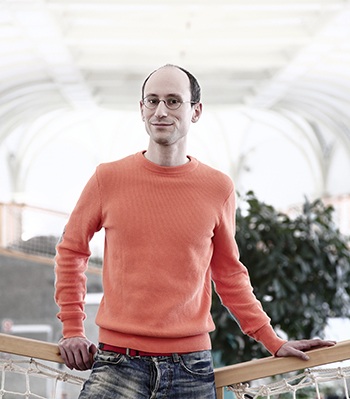I had to invent myself at KTH
Peter Arvai grew up in Karlskoga as an only child. His family lived in cramped conditions and money was in short supply. Peter excelled at school, and his high grades opened a world of opportunities for him. He chose to study Media Technology at KTH. Today he commutes between San Francisco and Budapest with his company, Prezi. The company has 60 million users and Peter Arvai is arguably one of the great entrepreneurs of our time.

Peter Arvai's father left Hungary during the Communist era, ending up in a refugee camp in Italy. A Swedish arms manufacturer was touring Southern Europe recruiting workers. It was a different time and Bofors was experiencing a labour shortage. That was how the Arvai family came to Karlskoga. Peter's mother eventually joined her husband and soon Peter entered the world.
"Growing up in this industrial town wasn't entirely easy," Peter says.
They lived in a small apartment, surviving on a low income. Peter Arvai's parents had left university, family and friends behind them in Hungary. In Sweden neither of them succeeded in getting skilled work.
As an only child, Peter wrestled with thoughts about his identity. He was taunted in school. But his studies went really well.
"I am really grateful for my schooling and for all the opportunities I had in Sweden. My strong grades meant that the world was my oyster".
But Peter didn't know what to study. Most people that he knew, with the same top grades, had their sights set on Chalmers University of Technology in Gothenburg. Peter had another plan. As a young man he made an anonymous phone call to a helpline.
"I think I'm gay. No-one knows about it. What should I do?"
And the answer he received was.
"Go to Stockholm. There are lots of gay people there".
So with the location decided, the choice was now between theoretical and engineering physics. Peter chose the latter, but it wasn't quite right. In physics there was no room for artistry and creativity. At the eleventh hour, he changed his mind and sent in a new application. He had read in the prospectus about a completely new programme, media technology.
"We were the first intake. Nobody knew what media technology was at that time. Why were we studying humanities and why were we interested in how society works? We had no examples, no clear frames of reference or professional goals. That's why the first generation of media technicians became entrepreneurs. We were forced to invent ourselves".
However, the journey was far from straightforward and Peter and his classmates had to negotiate numerous obstacles.
"There were too many of us in the class and the teachers seemed unprepared. However, I have subsequently realised that this frustration was an ideal preparation for life as entrepreneurs".
He devoted a lot of energy to his studies and alongside media technology he started studying business economics and journalism.
"My bicycle got a good workout between KTH, Stockholm University and the School of Journalism", he says laughing.
Eventually it was time to look for a job and Peter had no idea what career to pursue. The economics track seemed safest, but other areas were tempting. After graduation he was employed at a mobile start-up company as product manager. He set up mobile telephony services and made TED Talks accessible on mobiles, several years before the advent of smart phones.
"We often don't have sufficient information to make sensible decisions. I wanted to find out the best way to combine storytelling and technology to help people to make better decisions. As is the case with TED Talks, you just sit down on the underground and travel to work. With the right technology and attitude, in twenty minutes you can learn a great deal about a subject".
He had finally found his way. Peter Arvai realised that he wanted to work on projects that help people to understand what others are trying to convey.
"It’s astonishing how difficult it can be for people to understand one another! I want to do my bit to break down these barriers and revolutionize the way people communicate”.
At the same time as Peter was trying to build his career, his father had a heart attack and died. Peter's mother also fell ill.
It was now that Peter Arvai created OmVård.se, a database for comparing health centres, hospitals, specialists and geriatric care.
"In Sweden it is difficult for patients to determine the quality of the care they receive. There is no transparency within medical care. It is only when information can be compared that patients can make better decisions".
During the depths of the recession, Peter moved to Budapest. He wanted to acknowledge his own background and nourished a hope that he would have a future within information technology. Contacts enabled Peter to develop something that was to become groundbreaking. In 2009 the presentation tool Prezi was launched.
"Forget the old way of making presentations in PowerPoint. Prezi's design is based on how our brain is constructed. We have developed Prezi to maximise information intake".
Now things started to move quickly. In the space of a few years, Peter Arvai and his co-founder recruited people from over 30 countries (including Sweden) to move to Budapest. Prezi also opened an office in San Francisco, where Peter spends a large proportion of his time. Today 60 million people use Prezi and the company has the world's largest database of published presentations.
"I have worked very hard in recent years. What hurts is that my father never got to see my success".
What drives him forward is the desire to change the world. He would like to give people the opportunity to share their ideas with one another.
"I would like to return to KTH and tell everybody that it is possible to start up successful companies. Having a creative attitude is not something you are born with, it is something you have to nurture."

